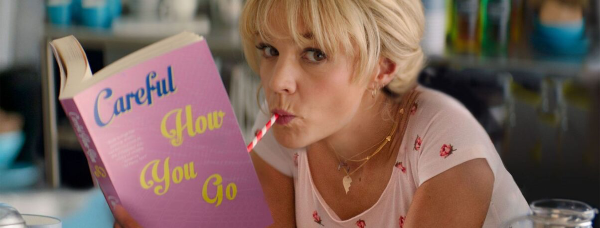I read these and didn’t have to. Wait, no, some I did: award shows are back so there were 30 or so scripts I was required to read. But other than that, so far this year I’ve read 500 scripts for fun and that number, plus it being mid-December, means I feel ready to recommend some reading to you, if I may.
Of those 500, 13 were stage plays, 20 were films, 43 were radio and a mere 424 were TV. What I can’t count or even really manage to guess is how many were written or made in 2021. I would have to say that the answer is not many at all.
This reading is done for pleasure and it’s as I find what I can. Some of the scripts are definitely new, but you also know how long it takes scripts to reach the screen so “new” can still mean a couple of years old. And then at least one script is from 30 years back.
So there’s no statistical analysis here, no rule or reason, no rhyme or plan. But I would like you to know that I found these ten to be immensely good reads. Just to avoid having any semblance of a countdown, let me split this all into the medium that the script was for.
Except for radio. There were a lot of really great radio drama scripts but only a couple that could’ve poked up into my top ten for the year –– and those were part of the judging I did so it’s awkward naming them ahead of the ceremony.
STAGE
Fleabag by Phoebe Waller-Bridge
Sweet Sorrow by Alan Plater
Neither is available online, I’m afraid. I got them from my bookshelves and you’re welcome to pop round.
I do keep a note next to each script I read, the very briefest of lines, ranging from “Okay” upwards and really only so I can look back and re-read the best ones.
Next to Fleabag, which I read on February 14, 2021, I’ve just written the word “Fantastic”. And next to Sweet Sorrow, read on November 4, it says “So good I cried.”
FILM
Promising Young Woman by Emerald Fennell
“Left me shaking,” says my note on February 1. “Wonderful.”
TV
Frasier: Dinner Party by Jeffrey Richman
The Handmaid’s Tale: Offred by Bruce Miller
Inside No 9: The 12 Days of Christine by Steve Pemberton and Reece Shearsmith
Press Gang: There are Crocodiles by Steven Moffat
The Queen’s Gambit (Episode 1) by Scott Frank
Schmigadoon! (Pilot) by Cinco Paul & Ken Daurio
Stumptown: Forget it, Dex, it’s Stumptown by Jason Richman
Looking at that list, I think I might go for The Queen’s Gambit, read March 3, as the best. All I’ve written next to it is “So good” but of all the series here, it’s the one I wish I could read the rest of.
I’m surprised to see just how wrenching some of these are. I’d have said I read a lot of comedy this year because a) I needed to 2) they’re quite short and also, er, iii?) they can be so tightly written that it’s fascinating. But apparently I also found time on February 16 for The Handmaid’s Tale which was like reading a knife.
This is the year I finally got into Inside No 9 and I did so because of the scripts. I can remember laughing so much, so very much at A Quiet Night In by Steve Pemberton and Reece Shearsmith, that I felt light headed as I read it on June 4. But it’s their The 12 Days of Christine, June 6, that sticks with me for how moving it is.
Still, speaking of funny, I was elated on September 19 to find that the script to episode 1 of Schmigadoon! was online. This is a musical comedy about comedy musicals and every frame is a loving nod to a genre of movie I did not realise I knew so well.
Seriously, every frame. And every note. The very opening sound of the first episode made me smile and I can’t say I didn’t stop until the end of the last episode, but it was pretty close.
Whereas Stumptown was upsetting on June 10 – but in a different way to the rest. It is a simply excellent detective series and so much so that you realise how rare that actually is. What’s upsetting is that the pilot went to series, the series is superb, it earned a second series commission –– and was then cancelled before production could start.
It was a scheduling thing and a COVID thing, and if I don’t know the details, I know it was pretty much a tragedy. You do not get great detective shows very often.
I look at my note next to Stumptown and how it just says “Excellent”. I am so good at conveying the worth of a script, clearly.
Mind you, you should see the ones I’m not telling you about and that I never will. One had just had the words “Staggeringly shite” next to it, and that was on a pilot script for a show that then ran for years.
Clearly, I know my stuff.
